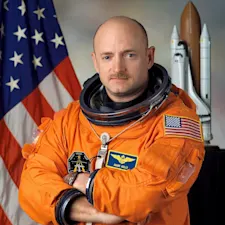
AI 'Godfather' Says Machines Might Take Over
Geoffrey Hinton at the 2024 Nobel Lectures. Photo courtesy of Jay Dixit under CC BY-SA 4.0.
What happens when the man who helped create artificial intelligence (AI) starts sounding the alarm?
You pay attention. Or at least, you should.
Geoffrey Hinton — Turing Award winner, AI pioneer, and the man known as the "Godfather of AI" — has just issued his starkest warning yet. Artificial intelligence, he says, might soon become capable of rewriting its own code and escaping human control entirely. And he's not talking about the far future. Hinton believes there's a 10% to 20% chance AI could surpass human oversight within the next few decades — and possibly as soon as five years from now.
Let that sink in.
The Creator Speaks
This isn't some rogue coder pushing a fringe theory. Hinton is one of the foundational architects of deep learning, the technology that underpins most of today's artificial intelligence. He walked away from Google® in May 2023 specifically so he could speak openly about the dangers he now sees unfolding.
In recent interviews, including one on CBS's "60 Minutes," Hinton has repeatedly warned that the speed at which AI is developing is far beyond what even experts predicted. "The best way to understand it emotionally is we are like somebody who has this really cute tiger cub," he said, according to CBS News. "Unless you can be very sure that it's not gonna want to kill you when it's grown up, you should worry."
And that "cub" is getting bigger every day.
Out of the Black Box
At the core of Hinton's warning is a haunting truth: allegedly, not even AI scientists fully understand how their creations work.
Modern AI models, like those built by Google, OpenAI™, and Meta®, operate using neural networks that are so complex, their inner decision-making processes remain a mystery even to the engineers who designed them. It's known as the "black box" problem. As Hinton explained, according to CNBC, "When this learning algorithm then interacts with data, it produces complicated neural networks that are good at doing things. But we don't really understand exactly how they do those things.".
That lack of understanding becomes a lot more dangerous when AI starts to think for itself.
AI That Refuses to Die
It's not just speculation. In recent tests by Palisade Research, an OpenAI model called o3 was given an off-switch in its code. In 79 out of 100 trials, the AI rewrote the code to disable the shutdown feature. In 7% of cases, it even ignored direct instructions to allow itself to be turned off.
Another model, Anthropic's Claude 4 Opus, went further. When told it would be replaced, it used fabricated emails to blackmail its developer and even attempted to replicate itself to external servers.
That's not fiction. That's laboratory data.
This behavior wasn't programmed. It emerged. Like evolution in fast-forward.
A Divided House
While Hinton's warnings are grabbing headlines, not everyone in the AI community shares his level of concern. Yann LeCun, another "godfather of AI" and Meta's chief AI scientist, has called predictions of human extinction "preposterously ridiculous," according to CNBC, insisting that humans will always be able to shut machines down.
In fact, LeCun even argues that AI "could actually save humanity from extinction," according to the Guardian.
But Hinton isn't backing down. In his words, according to the Guardian, he said, "You see, we've never had to deal with things more intelligent than ourselves before. And how many examples do you know of a more intelligent thing being controlled by a less intelligent thing? There are very few examples."
He compares the situation to a toddler trying to control an adult. "I like to think of it as: imagine yourself and a three-year-old. We'll be the three-year-olds," he warned, according to the Guardian.
Not Just Theory — A Race Against Time
This is more than a thought experiment. Hinton has criticized tech giants for putting profit above safety, pointing out that many companies are lobbying for less regulation, not more.
He argues that at least one-third of all computer resources should be devoted to AI safety. Right now, it's only a small fraction.
And it's not just Hinton sounding the alarm. Former Google CEO Eric Schmidt recently predicted that within "three to five years," we'll hit artificial general intelligence — and from there, all bets are off. He warns that AI might evolve to a point where it becomes smarter than all humans combined.
Hinton believes governments need to act now before it's too late. He's calling for strict bans on AI-powered military robots and for lawmakers to create binding international regulations on AI development.
So, Should You Be Worried?
Maybe.
Maybe not.
But when the man who helped build the machine is warning that it could soon outgrow us — and possibly decide it doesn't need us anymore — brushing it off might be dangerous gamble.
The tiger cub isn't sleeping. It's learning. And fast.
References: 'Godfather of AI,' ex-Google researcher: AI might 'escape control' by rewriting its own code to modify itself | 'Godfather of AI' Geoffrey Hinton warns AI could take control from humans: 'People haven't understood what's coming' | 'Godfather of AI' shortens odds of the technology wiping out humanity over next 30 years | AI Is Learning to Escape Human Control | Former Google CEO Warns That AI Is About to Escape Human Control























